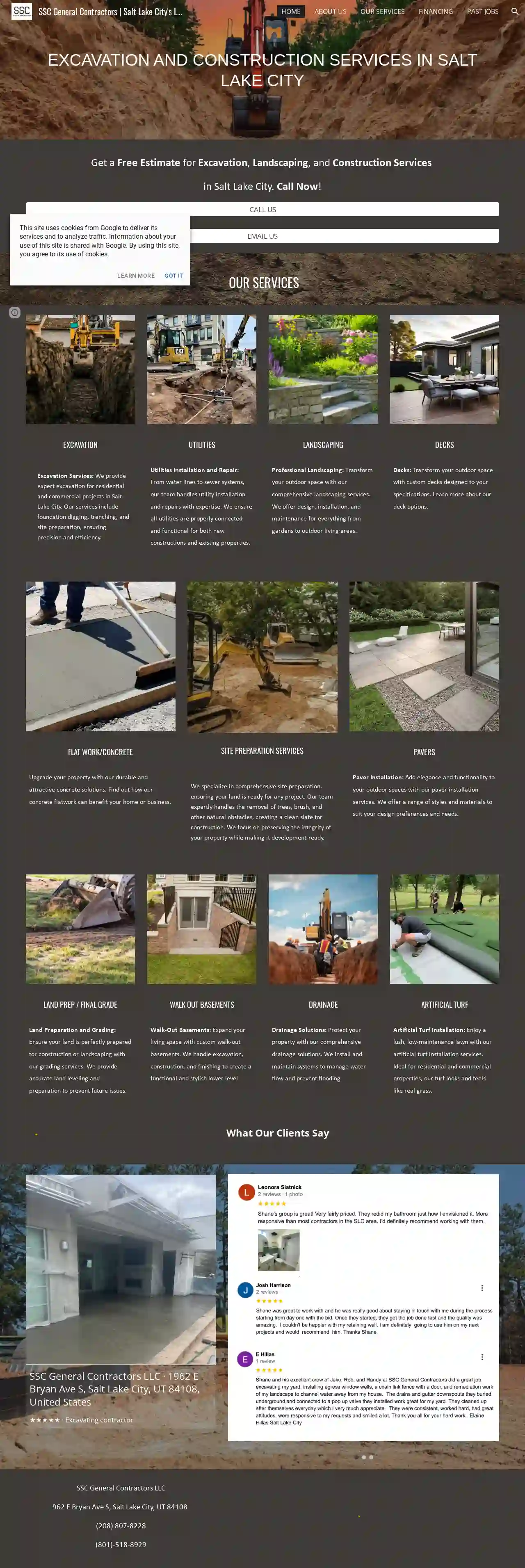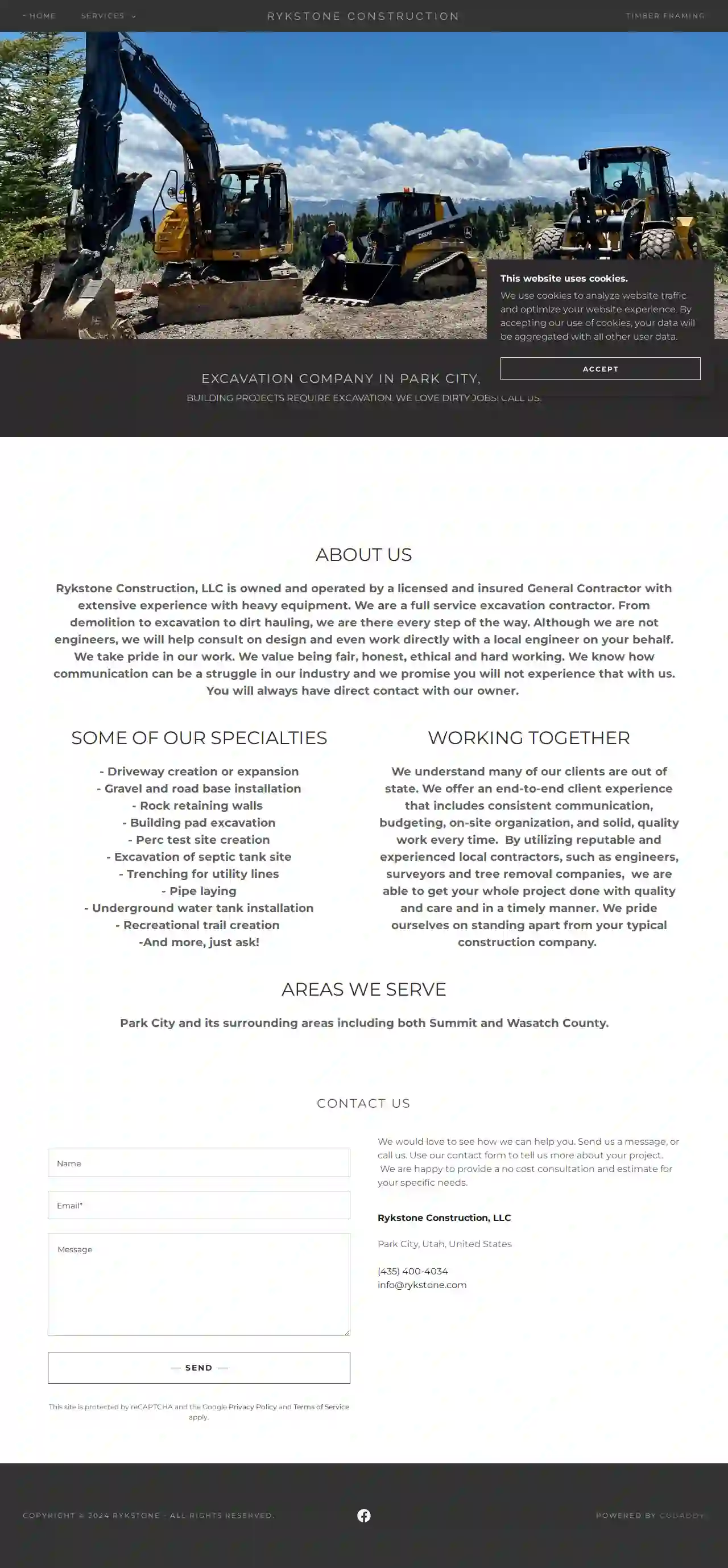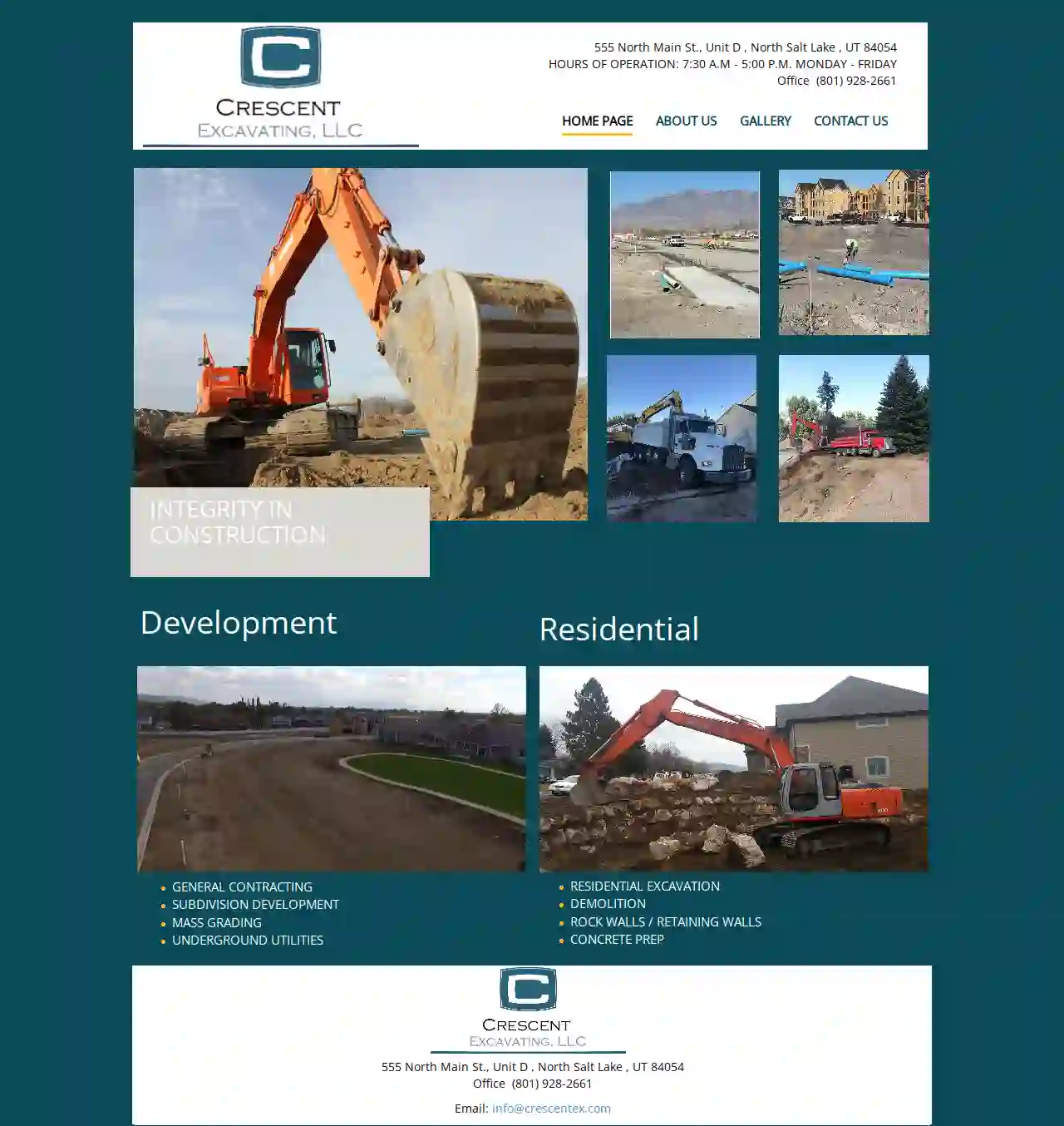Dirt Contractors Eugene
Find top Dirt Contractor in Eugene
Get 3 FREE Dirt Contractors quotes for your project today! Compare profiles, reviews, accreditations, portfolio, etc... and choose the best service.

SSC General Contractors LLC
4.730 reviews962 E Bryan Ave S, Salt Lake City, 84108, USAbout Us At SSC General Contractors, based in Salt Lake City, we specialize in excavation, landscaping, and general contracting across Utah. Our mission is to deliver exceptional quality and service on every project, from residential renovations to large commercial developments. We serve the greater Salt Lake City area, including Draper, Sandy, and surrounding neighborhoods. Explore our Excavation Services and Landscaping Solutions for more information. At SSC General Contractors, we're not just moving earth—we're transforming landscapes and building trust, one project at a time.
- Services
- Why Us?
- Gallery
Get Quote
Bridge Construction
4.36 reviewsEugene, USAbout Bridge Construction Welcome to Bridge Construction, your trusted partner in excavation and construction services based in Utah. We are a licensed contractor specializing in a broad spectrum of services for both residential and commercial properties. Our expertise spans across various domains, ensuring your project is handled with the utmost professionalism and quality. Excavation and Construction Experts At Bridge Construction, we excel in providing top-notch excavation services, essential for both residential and commercial properties. Our civil construction capabilities encompass a wide range of services, including landscaping projects such as rock retaining walls and crucial construction preparation tasks like land clearing. We are dedicated to transforming your property with precision and care. Our Specialties General Contracting: Comprehensive management and execution of construction projects. Excavation: Expert site preparation, digging, and grading services. Landscaping & Hardscaping: Creating beautiful and functional outdoor spaces with rock retaining walls, patios, and pathways. Sewer & Utility: Reliable installation and maintenance of essential utilities. Concrete & Asphalt: Precision work for driveways, parking lots, and other paved surfaces. Building Services: From custom homes to multi-functional ADUs, we handle it all. Land Clearing and Tree Removal: Efficient clearing of land for new projects. Our Priorities at Bridge Construction Customer Satisfaction: Ensuring our customers are delighted with our work is our foremost priority. We focus on every detail to make your construction project last for years, leaving nothing overlooked. Reliability: We pride ourselves on being a dependable company. You can trust us for clear communication, adhering to timelines, and fulfilling all promises. We meet deadlines without compromising the quality of our work. Safety: Safety is paramount in every project we undertake. At Bridge Construction, we use the right equipment and technology to ensure the safety of our team and everyone around. By hiring us, you ensure a safe and accident-free construction environment. Thank you for considering Bridge Construction for your next project. We look forward to working with you to bring your vision to life with the highest standards of quality and professionalism.
- Services
- Why Us?
- Gallery
Get Quote
Precision Asphalt
32 reviewsEugene, USExcellence in Utah Asphalt Paving Precision Asphalt specializes in all things asphalt, including new asphalt pavement installations, overlays and replacement. Learn More Asphalt Repair Precision Asphalt specializes in the total Utah asphalt repair utilizing cutting edge technology for superior results. Learn More Seal Coating Extend the life of your asphalt with the protective qualities of an asphalt sealant. We are the Utah Seal Coat experts! Learn More Crack Sealing If you see asphalt cracks in your Utah parking lot or driveway, call All Precision Asphalt Maintenance before it’s too late. Learn More Commercial Asphalt Maintenance of commercial property is a significant investment. Don’t be fooled by ‘budget’ sealant work. When you work with Precision Asphalt, you can rest assured that you are receiving the highest quality products possible. Services include sealcoating, crack repair, patchwork, line striping and more. Learn More Residential Asphalt Collectively completing thousands of residential jobs every year, Precision Asphalt is Utah’s trusted leader in the driveway maintenance industry. Focused on customer service first, Precision will use superior application techniques to apply premium industrial grade sealant and crack-filler and address other needs. Learn More Frictional Mastic Seal Quick and tough, Onyx® frictional mastic surface treatment was created to be the fast-drying asphalt roadway and pavement sealing solution you’ve been looking for to cover your Utah asphalt. Onyx will extend the life of your pavement, combining the durability you want from a pavement maintenance sealer. Learn More Parking Lot Striping Our team has established an outstanding reputation in Parking lot striping Utah amd Wyoming and quality service working to the highest standards in the industry.We work for all types of commercial & industrial companies road work,game courts,airports, as well as apartment & condominium associations. Learn More Welcome to Precision Asphalt Maintenance, providing the best asphalt paving to the entire Wasatch front. We do not limit ourselves to the Salt Lake area alone, but service the entire state of Utah, into Idaho and Wyoming as well. We have been laying asphalt for our customers in Utah for the last 10 years! As professional paving and concrete contractors, we know what our clients’ needs are. It can be challenging to make your real estate investment look great. Through the last decade of business, our job have taught us how to predict and determine what challenges our customers may come across, while competing an asphalt maintenance project. Our client base includes: Commercial construction Industrial construction National retailer construction Town home & Condo Associations Governmental Agencies Precision Asphalt Maintenance is a comprehensive asphalt provider. Our services include: asphalt seal coating, asphalt crack-sealing, pavement marking, sign installation, new asphalt installation, asphalt milling & replacement, asphalt overlay, and concrete repair and installation. If you believe that your pavement is in need of a removal and replacement, please call us at 801.882.2429or email us today for a quote. Our experts are available to review your needs and start taking action right away.
- Services
- Why Us?
- Gallery
Get Quote
Stapp Construction
3.128 reviews445 North 700 West, Suite 110, North Salt Lake, 84054, USOUR STORY We might not be the biggest, but we're definitely the best. Better is. Greg Stapp built this company in 1978 with a simple goal in mind: to become Utah's best contractor by building the right way. And while you won't find chilled coconut water or expansive board rooms here, you will find a group of hard-working, incredibly talented, extremely caring people dedicated to getting every job done right. OUR SERVICES BEEN THERE, BUILT THAT. From heavy civil and commercial, to framing, seismic upgrades and anything in between. No matter the size, shape, or budget-you name it, we've built.
- Services
- Why Us?
- Gallery
Get Quote
Preferred Paving
3.418 reviews3280 West Directors Row, Salt Lake City, 84104, USThe people of Preferred Paving Bill R. Panunzio, Curt Collard and Ryan Greenwood are the management team behind Preferred Paving and Asphalt Maintenance Company for a combined 100 years. Our Story Our number one priority is to do the job right the first time with the best and most experience crew, and the best equipment for the job. Our objective is to build long-term relationships with our customers and employees. The best way we’ve found to make that happen is to provide quality grading and asphalt paving services every time on every job with the best crew and the best equipment. Because our crew is our number one asset we focus on their safety and have made safety our biggest priority. Preferred Paving has won numerous safety awards including the Utah Safety Council “Perfect Record Award” and “Award of Merit” in 2018. For more than 30 years, Preferred Paving has been providing local Salt Lake City business with quality grading, asphalt paving, patching, seal coat, slurry, and crack seal. We oversee every aspect of the job from excavating and preparing the site to the final striping and cleanup. We invite you to give us a call and let us give you a bid for your next paving project. Preferred Paving named 2021 contractor of the year finalist Every year the folks at Equipment World and Caterpillar nominate, vote and name their top 10 Contractors of the year. In 2021 Preferred Paving made the cut and was recognized at a Contractor of the Year Awards Banquet along with the other nominees. We are proud of our team for making this possible. We are also proud of this accomplishment and work hard to always stay at the top of our field in this competitive industry. See video below for more information. The reason for our success We never leave a job until the customer is 100% satisfied. We bid every job fairly and always keep in mind budgets and cost projections. We show up on time and meet or exceed job deadlines and goals. We have a great reputation for working hard and staying safe. Our crew is hard-working, skilled and easy to talk to at the job site. We always do what we say we will do during every step of the job.
- Services
- Why Us?
- Our Team
- Testimonials
- Gallery
Get Quote
Rykstone Construction
57 reviewsEugene, US- Services
- Why Us?
Get Quote
Crescent Excavating, LLC
2.45 reviewsEugene, US- Services
- Why Us?
Get Quote
Eckles Paving
5287 reviews123 Main Street, Salt Lake City, 84047, USUtah Asphalt: Your Trusted Partner for Quality Asphalt Services Utah Asphalt is a family-owned and operated business with over 20 years of experience in the asphalt industry. We are committed to providing our clients with the highest quality asphalt services at competitive prices. We specialize in a wide range of asphalt services, including: Asphalt paving Asphalt repair Asphalt sealcoating Asphalt crack sealing Asphalt resurfacing We are dedicated to providing our clients with exceptional customer service and a commitment to quality. We use only the highest quality materials and equipment to ensure that our work meets the highest standards. We are also fully licensed and insured, so you can rest assured that your project is in good hands. Whether you are a homeowner, business owner, or government agency, we can help you with all your asphalt needs. Contact us today for a free estimate.
- Services
- Why Us?
- Testimonials
Get Quote
Over 3,943+ Excavation Businesses onboarded
Our excavation providers operate in Eugene & beyond!
ExcavationHQ has curated and vetted Top Excavation Businesses in and around Eugene. Find a top & reliable pro today.
Frequently Asked Questions About Dirt Contractors
- Dirt Type: Clay soils tend to settle slower than sandy soils due to their smaller particle size and higher water retention.
- Compaction: Proper compaction helps accelerate the settling process by reducing air pockets and increasing soil density.
- Moisture Content: Excessive moisture can prolong settling time, as the water needs to evaporate or drain away.
- Weather Conditions: Warm, dry weather promotes faster settling compared to cold or wet conditions.
- Online Directories: Utilize online directories like ExcavationHQ that specialize in connecting homeowners and businesses with qualified contractors. You can filter your search by location, service type, and read reviews from previous customers.
- Referrals: Ask friends, family, neighbors, or colleagues for recommendations based on their experiences with dirt contractors.
- Local Building Supply Stores: Inquire at local building supply stores, as they often have connections with contractors in the area.
- Online Reviews: Check online review platforms like Google My Business, Yelp, and Angie's List for insights into contractor reputations and customer feedback.
- Clearly Define Your Project Scope: Provide the contractor with detailed information about your project, including the size of the area, the type and volume of dirt needed, the desired grading or leveling, and any specific requirements.
- Obtain Multiple Quotes: Request quotes from multiple reputable dirt contractors to compare prices, services, and experience. Ensure the quotes are comprehensive and include all project details.
- Verify Licensing and Insurance: Confirm that the contractor has the necessary licenses, insurance coverage, and a good safety record. This protects you from potential liabilities.
- Communicate Openly and Regularly: Maintain open communication with the contractor throughout the project, addressing any questions, concerns, or changes promptly. Regular updates and site visits can help ensure everything is on track.
- Document Everything: Keep written records of all communication, contracts, quotes, and invoices for reference and accountability.
- Large-Scale Excavation: Assessing soil conditions, designing slopes, and ensuring stability for large excavation projects.
- Foundation Design: Determining the appropriate foundation type and depth based on soil bearing capacity and other factors.
- Retaining Walls: Designing retaining walls to stabilize slopes, prevent erosion, or create level areas on sloped sites.
- Slope Stability Analysis: Evaluating the stability of slopes and recommending measures to prevent landslides or erosion.
- Contaminated Soil Remediation: Developing and implementing plans to clean up contaminated soil.
How long does it take for dirt to settle after delivery?
How do I find a reputable dirt contractor near me?
What are some tips for working with dirt contractors?
What is a soil engineer, and when might I need one?
How long does it take for dirt to settle after delivery?
- Dirt Type: Clay soils tend to settle slower than sandy soils due to their smaller particle size and higher water retention.
- Compaction: Proper compaction helps accelerate the settling process by reducing air pockets and increasing soil density.
- Moisture Content: Excessive moisture can prolong settling time, as the water needs to evaporate or drain away.
- Weather Conditions: Warm, dry weather promotes faster settling compared to cold or wet conditions.
How do I find a reputable dirt contractor near me?
- Online Directories: Utilize online directories like ExcavationHQ that specialize in connecting homeowners and businesses with qualified contractors. You can filter your search by location, service type, and read reviews from previous customers.
- Referrals: Ask friends, family, neighbors, or colleagues for recommendations based on their experiences with dirt contractors.
- Local Building Supply Stores: Inquire at local building supply stores, as they often have connections with contractors in the area.
- Online Reviews: Check online review platforms like Google My Business, Yelp, and Angie's List for insights into contractor reputations and customer feedback.
What are some tips for working with dirt contractors?
- Clearly Define Your Project Scope: Provide the contractor with detailed information about your project, including the size of the area, the type and volume of dirt needed, the desired grading or leveling, and any specific requirements.
- Obtain Multiple Quotes: Request quotes from multiple reputable dirt contractors to compare prices, services, and experience. Ensure the quotes are comprehensive and include all project details.
- Verify Licensing and Insurance: Confirm that the contractor has the necessary licenses, insurance coverage, and a good safety record. This protects you from potential liabilities.
- Communicate Openly and Regularly: Maintain open communication with the contractor throughout the project, addressing any questions, concerns, or changes promptly. Regular updates and site visits can help ensure everything is on track.
- Document Everything: Keep written records of all communication, contracts, quotes, and invoices for reference and accountability.
What is a soil engineer, and when might I need one?
- Large-Scale Excavation: Assessing soil conditions, designing slopes, and ensuring stability for large excavation projects.
- Foundation Design: Determining the appropriate foundation type and depth based on soil bearing capacity and other factors.
- Retaining Walls: Designing retaining walls to stabilize slopes, prevent erosion, or create level areas on sloped sites.
- Slope Stability Analysis: Evaluating the stability of slopes and recommending measures to prevent landslides or erosion.
- Contaminated Soil Remediation: Developing and implementing plans to clean up contaminated soil.